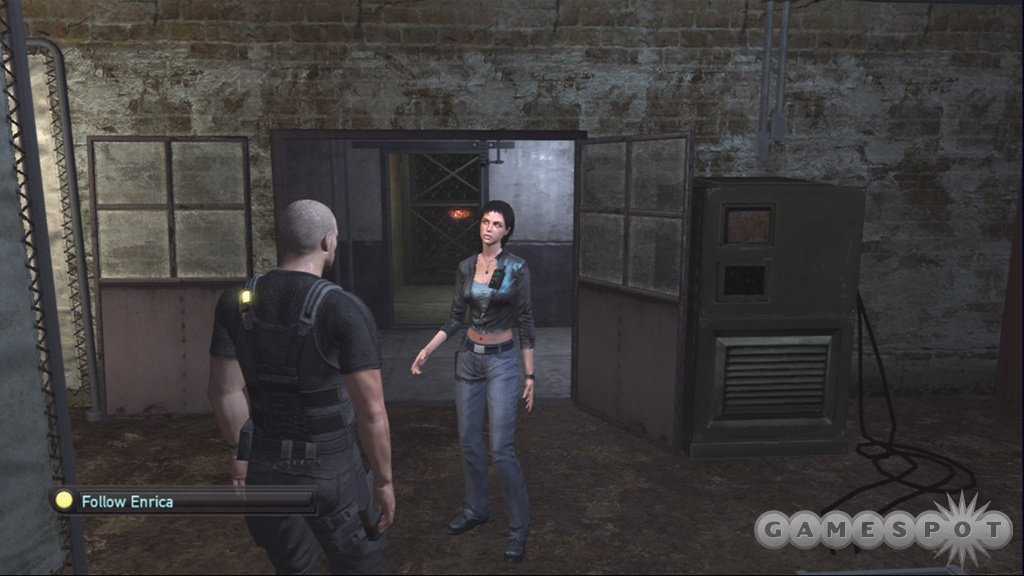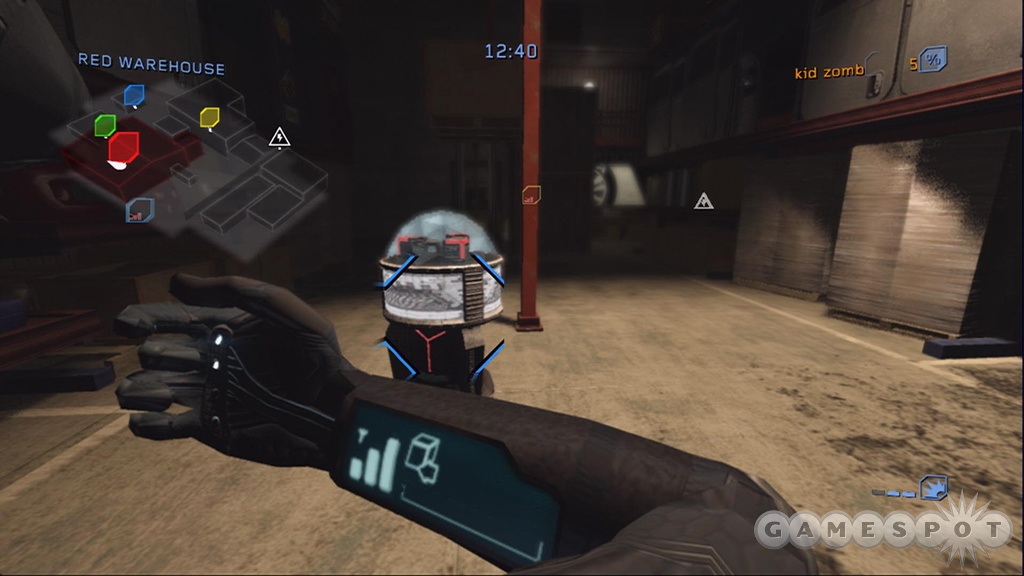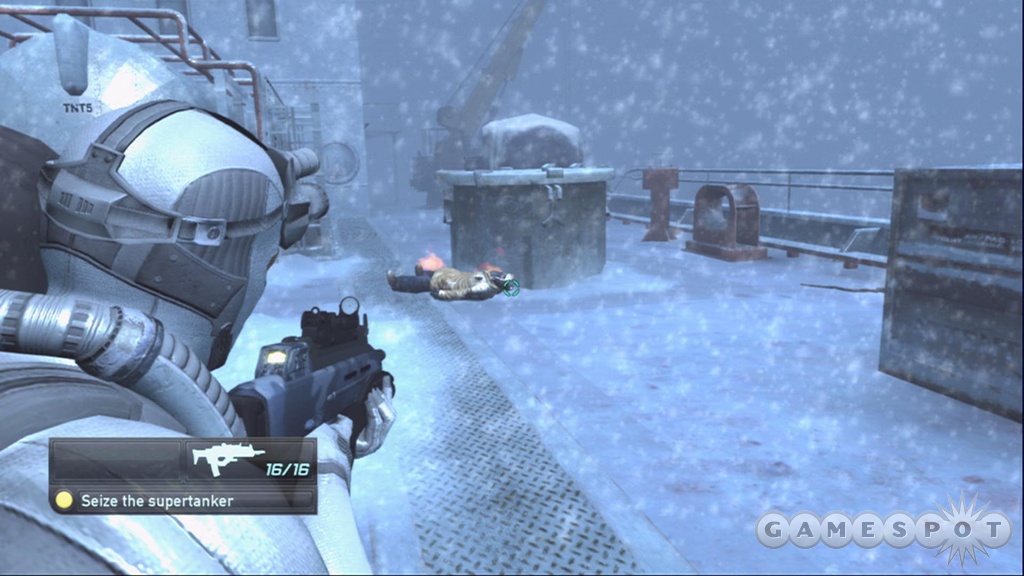It was back in 2002 when we first met Sam Fisher, a jaded but extremely talented secret agent who was sent all around the world to take care of the most sensitive, covert operations conducted by the United States. Tom Clancy's Splinter Cell became one of the defining franchises of the original Xbox, thanks to its incredibly lifelike graphics and sophisticated stealth action gameplay. So it seems reasonable to approach this latest installment with high expectations: With all that Splinter Cell has done on the Xbox, surely it can do much more on the Xbox 360. Yet despite a compelling new premise that forces Fisher to make some tough moral choices to infiltrate a terrorist group, Splinter Cell Double Agent's campaign may best be described as Splinter Cell with a fresh coat of paint. The single-player portion of the game possesses all of the strengths and weaknesses that fans of the series have come to expect. On the other hand, the game's refreshingly original multiplayer component, which is like a whole separate game, has seen a variety of interesting changes since the last game, making it the better half of a great package.

Even though the Splinter Cell games bear the name of a famous author, they have never been particularly good at telling stories, despite the fact that Sam Fisher has always stood out as a great character. Double Agent gives the impression that it might buck this trend. Early on in the game, Fisher loses his cool and winds up in prison after he's given some very bad news. Unfortunately there's no real follow-through on this plot point because Fisher's incarceration turns out to be a setup for him to get in good with an upstart terrorist group oddly called John Brown's Army (JBA). The JBA tentatively accepts Fisher as one of its own...but he's still working for the National Security Agency (NSA), which orders him to play nice and learn what makes these terrorists tick. The terrorist leaders have some personality, but they've got a pretty conventional blow-stuff-up plan. The game's whole premise wears thin as Fisher keeps getting crucial assignments from the bad guys, who inexplicably supply him with the experimental government-issue assault rifle he's always used. Eventually you'll wonder why Sam can't just kill them all and be done with it. But your patience will be rewarded, as there's an action-packed finale and multiple endings to look forward to based on the choices you make along the way.
From a gameplay standpoint, ultimately there's not much new or different about the single-player campaign of Double Agent versus that of the previous game, Chaos Theory. If you've played that game, then expect to use all the same moves and abilities to get through Double Agent's dangerous levels, all crawling with enemy patrols. Most of all, you'll be quietly sneaking through these levels while keeping a low profile, sometimes creeping up from behind foes either to put them in a vice grip for an interrogation session, or just put them out of their misery with a quick, lethal knife attack. The controls are complicated to learn if you don't already know them, as even the simple act of opening a door presents you with multiple options: slam it open, use an optical cable to see what's on the other side, and more. But a couple of slick training missions make the learning curve more tolerable. Once on a real mission, enemy forces will respond to you by using the same tactics and behavior you'll probably recognize from the previous games, which still can't be considered a remarkable display of artificial intelligence. If you move too quickly, nearby guards will wander around searching for you. And if they spot you, they'll run behind cover and open fire. That's really about it. While the game's environments are all new, and some are very impressive, seeing all of the recycled moves, animations, and sound effects makes Double Agent's campaign feel like an update rather than a full-on sequel.
However, there's a new trust system that gives the missions a different, often more free-form tone than missions from previous Splinter Cell games. There are also moments during the campaign when Fisher must make some sort of tough moral choice to stay in the JBA's good graces, though you could count these moments on one hand. The trust system mostly forces you to be more careful. Getting spotted by enemies will cause you to lose some of either the NSA's or the JBA's trust, and if either of your two trust meters runs out, it's game over. The trust meters carry over from mission to mission, but by completing optional mission objectives for both the JBA and the NSA, you can remain in the good graces of both organizations. In practice, on the default difficulty setting, it isn't difficult to maintain your trust with both sides. Even so, the game takes a step back from Chaos Theory by including a number of potentially frustrating instant-fail situations, such as if JBA terrorists catch you trying to pick a lock inside their base. The penalty isn't always this severe, as if a JBA agent catches you skulking about in a restricted area, he'll chase you out as your trust meter dwindles. Still, this is usually a good enough reason to load a saved game. The trust system makes for an interesting twist, but Double Agent still mostly boils down to a linear series of stealth missions, each with some major objectives and some optional secondary tasks.

The JBA base missions are a new concept for Splinter Cell, and they're hit or miss. You get about 30 minutes to snoop around and try to accomplish as many different objectives as possible. Sam can't attack his foes during these sequences, and if he's caught sneaking by his JBA brothers, their reactions just aren't believable. On the other hand, the way Sam switches from a casual walk into his low stealthy crouch when he enters into a restricted area is a great, immediate indication that you're about to conduct some risky business. Getting through undetected is tense and feels rewarding, though these open-ended, pure-stealth missions will have you frequently reloading saved games until you can find the right way to slip through the JBA's security. The first couple of visits to the JBA base are entertaining, but because you'll return here between almost every major mission, it's less exciting after a while. And during one such mission, you're forced to decrypt an e-mail by completing a 3D sudoku puzzle, which seems oddly out of place.
Fisher's main assignments in Double Agent take him everywhere from a massive tanker caught in a freezing-cold Russian winter to a sweltering-hot African town that's wracked by war. Interestingly, most of these missions take place in broad daylight, so Fisher will need to hide behind cover much more often than he'll need to slink through the shadows. In fact, you could go through pretty much the whole campaign without ever using his signature night vision goggles, and he won't even have them half the time anyway. The game's main missions are quite lengthy and challenging, and it's generally up to you to decide whether to try to sneak past your foes or fight them.
The shooting in Double Agent feels exactly the same as before, so it's not particularly satisfying and is mostly a means to an end. You must aim while standing perfectly still in order to shoot with any accuracy, and Fisher moves slowly when his gun is equipped anyway, which prevents you from playing this or any Splinter Cell game in a run-and-gun fashion. And besides, the silenced pistol and rifle Fisher uses just don't pack much of a visceral punch. Fisher also has the same quick lethal and nonlethal close-combat attacks he had in Chaos Theory and remains powerful enough to take down one or two guards head on.

One noteworthy change to the gameplay is that, in a nod to Halo 2, there are no health packs--Fisher's life recovers automatically if he avoids damage for a few seconds. This doesn't add to the game's realism any more than health packs do, but it gives you one less thing to worry about and probably makes the game a little easier overall. Of course, you can still be killed very quickly if unexpectedly caught by a rifle-toting opponent. Although a violent approach is often the easiest way out, it's not always an option at the hard difficulty setting, which starts you off without any ammo and makes you lose a lot more of the NSA's or JBA's trust whenever you slip up. Fortunately, Fisher now has access to an onscreen map that points out enemies in the vicinity. The only catch is that the map will only refresh when he stops moving, so you need to tread carefully. You can also access a more-detailed 3D map, which can be confusing to read in some of the bigger levels, but it still is essential for locating some of your objectives.
Double Agent's single-player campaign is roughly the same length as that of the previous games, so you should be able to get through it the first time in 10 hours or less. There's some replay value there: the higher difficulty setting, numerous unlockable gadgets you get from completing optional missions, multiple endings, and a few unlockable achievements that are tough to earn the first time through. However, most of this game's lasting value comes from its multiplayer mode. It's still based on the innovative concept from Splinter Cell Pandora Tomorrow, which pitted small teams of quick and nimble spies against heavily armed mercenaries; but the pace is quicker, you can have six players in a match (up from four), and the whole experience is more streamlined and somewhat less complicated than previous versions. Interestingly, the game also prohibits you from playing on all of the available maps until you've earned some experience, which is a good thing because each of the approximately 10 maps is intricately designed and you need to learn their ins and outs before you can play on them effectively.
The last two Splinter Cell games offered multiple game variants for each map, but they were all pretty similar. In Double Agent, the point of each map is quite clear: The spies must download files from one of several different terminals and return those files to their insertion point, while the mercenaries must stop them. Even though it's been true of the last two Splinter Cell games, the fact that the spies and the mercenaries play so differently still makes this multiplayer mode feel unique. The spies are controlled from a third-person perspective, like Sam Fisher, while mercenaries are controlled strictly from a first-person viewpoint. The mercenaries make up for having less maneuverability and situational awareness by packing a big gun with unlimited ammo, among other things.
The spies are even less like Sam Fisher than they used to be, which is great. They move about twice as fast as Fisher and have a number of their own unique moves and animations. What they don't have anymore is any kind of conventional weapon, though they can still use smoke grenades and other gadgets, as well as their high-tech wristband for neutralizing mercenaries' weapon systems. This same device is used for taking out lights, breaking glass, and downloading those precious files--a process that takes dangerous number of seconds. As soon as a spy starts downloading files from a terminal, the mercenaries are alerted to it and may follow an onscreen minimap to quickly get to the action. However, tracking down those pesky spies can still be difficult because most multiplayer maps in Double Agent are very, very dark, unlike the single-player missions.
Spies can't withstand much damage from mercenary machine guns, but they can still take out mercenaries by dropping on their heads or sneaking up behind them and snapping their necks. Mercenaries, in turn, can slam spies to the ground with a swing of their rifles and finish them off with a powerful head butt. It's great fun to pull off these types of moves in a multiplayer match, though there's a lot more sneaking and stalking in a typical match than full-on combat. Even so, the pace is quicker and better overall than in previous versions of this multiplayer mode. Spies don't have to worry so much about getting caught by laser trip wires and other defenses, but they have more to fear from mercenaries who quickly discover them as soon as they begin downloading from a terminal. And it's worth noting that having six players in these matches also greatly affects both the pace and the strategy. Spies seemingly have to work a little harder than mercenaries to accomplish their objectives, but by spreading out and attacking different terminals at the same time, they can divide and conquer. Mercenaries can meanwhile use a special vision mode to detect spies who are trying to download files, which lets them get pretty sneaky themselves.
As you play and win successive matches, you can unlock a variety of achievements and other bonuses (like a few alternate outfits for the spies and mercenaries) to help reward your continued effort. You can play both ranked and unranked matches online, and because coordination is the key to success in this game, you may also form a squad with some of your friends and compete against other squads. Interestingly, Double Agent optionally lets you play with or against computer-controlled bots on the mercenary side, but not the spy side, presumably because the spies have too complicated of a job for the artificial intelligence to handle. The mercenary artificial intelligence is available in three difficulties and provides a respectable challenge. Double Agent also features a series of cooperative missions, which cast you and up to two other players as the spies and put you up against computer-controlled mercenaries. Some of these missions even have a competitive twist to them. They're essentially similar to the core multiplayer game, but they don't have human players controlling the mercenaries. So these aren't the stand-alone, story-driven co-op missions as seen in Chaos Theory, but there are a lot more of them than in the last game, and the underlying gameplay is faster and more exciting.

What immediately stood out about the original Splinter Cell game was its presentation, but the series' presentation has come to feel like a given. In terms of the visuals, Double Agent lives up to the series' high standards but makes no clear effort to exceed them. Certainly, this new game looks much cleaner and more detailed running in HD on the Xbox 360 than the old games did on the Xbox, but apart from a lot of added detail to Fisher's character model and the fantastic-looking Africa level, the presentation's improvements aren't significant. Some unsightly frame rate issues even crop up from time to time, and the sound effects, while still fitting, seem to have been recycled from the very first Splinter Cell. Some fairly long loading times and an awkward menu system also mar the overall experience a bit. It takes a while to switch from single-player to multiplayer modes, and during multiplayer loading screens before each match, you'll get the same basic tutorial info that's only useful the first few times. Thankfully, gravelly-voiced Michael Ironside still puts in a good performance as Fisher, but there's less banter and dry humor in the script compared with Chaos Theory. The rest of the voice acting is solid, and there are only good things to be said about the game's new soundtrack, which is perfectly fitting superspy-sounding stuff that gets louder and tenser when Fisher gets up close to an enemy. Music also picks up at key moments during multiplayer--when it's time for a spy to get those files back to extraction or to die trying.
Sam Fisher is the star of the Splinter Cell series, so it's odd that the multiplayer portions of these games, which he's in no way a part of, seem to be evolving much more rapidly than the solo campaigns. Double Agent's few keen twists on Splinter Cell's single-player gameplay don't result in a remarkably different experience from the previous games, though that doesn't mean it still isn't some of the best stealth action out there. The multiplayer portion, meanwhile, introduces some inventive changes that seem to be for the better and that help make this unique mode easier to get into and often more exciting to play than before. And these two parts add up to an excellent game.